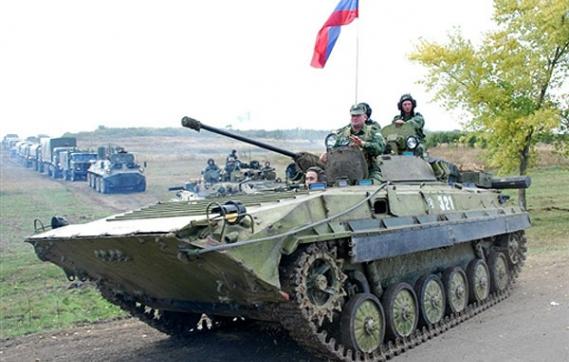
Russian troops gathering near Lysychansk and Debaltseve. (Sept. 15. 2014).
LUHANSK Ukraine (Reuters) - Surveying a ruined airport in the rebel stronghold of Luhansk, the ex-Russian paratrooper in trademark blue beret boasts that only "professionals" such as him can turn the tide in the conflict with Kiev in eastern Ukraine.
Yakut, the nom de guerre offered by the fighter, says he left the Russian armed forces to fight with pro-Russian rebels in Ukraine. When his job here is done, it is to the ranks of the Russian army that he will return.
"Yes sir," he says. "There can be no other way."
Moscow has repeatedly denied it is supporting or arming the rebels and says its military is not engaged in Ukraine. If there are Russian citizens fighting with the rebels, they are private citizens with no links to Russia's armed forces, it says.
However, rights activists in Russia and groups bringing together mothers of soldiers cite growing evidence that Russian paratroopers have been wounded and killed in Ukraine.
In Luhansk, along with his comrades from across the border in Russia, Yakut says he commands a unit in charge of protecting a devastated city with no electricity or running water. Once home to 500,000 people, only a few hundred celebrated a city festival on Sunday.
The guns have fallen largely silent since a truce was implemented on Sept. 5, after five months of fighting that claimed over 3,000 lives but in the absence of a settlement, tensions remain high and the Russians remain.
"It's not the (local) militia here anymore, it's mostly Russians who take part in combat," says the former paratrooper.
"It's the professionals here now." In his late 40s, an automatic rifle slung over his arm, Yakut is eager to stress he is no longer serving in the Russian army.
"The locals are mainly farmers, miners who have no combat experience. And the guys who are coming in - they are experienced people who have been through more than one war," says Yakut, strolling between the shattered terminal building, damaged aircraft and debris covering what used to be the tarmac of Luhansk airport.
The presence of Russian boots on the ground in east Ukraine has become a major international issue since the separatists opened a new front near the Sea of Azov, some 250 km (160 miles)south-west of Luhansk, in late August.
Kiev and the West, who accuse Russia of fanning the conflict and supporting the separatists, say the push was only possible with Russian financing, military equipment and serving troops.
The offensive turned the tables on the advancing Kiev troops and helped the rebels win back some ground, including around Luhansk and Donetsk, the main rebel stronghold in Ukraine's Donbass coal mining region.
"FORMER" PARATROOPERS
Yakut acknowledges the arrival of people like him was behind the recent advances of the separatists, who have declared a breakaway republic and many of whom seek union with Russia.
Members of the Ukrainian national guard seen at a checkpoint nearby the town of Slavyanoserbsk, in Luhansk region September 10, 2014
Yakut refuses to say when or where exactly he came from, but says he as well as most of his comrades were with the Russian paratroopers before resigning to come to Ukraine.
He says Russia is not providing military equipment to the rebel forces who instead seized it from the Ukrainian side.
He says mostly former Russian paratroopers were now engaged in fighting, significantly curbed since the ceasefire announcement, including his unit named after the Ukrainian city of Odessa and which he said was tasked with "restoring order".
Reuters was not able to verify that independently.
The weekend saw heavy fighting, for instance, around Donetsk airport, which remains under government control.
But a Reuters reporter traveling from Donetsk to Luhansk on a rebel-controlled road on Sunday went through 14 roadblocks, mainly manned by men in the Russian paratroopers' trademark blue berets and undershirts with horizontal blue and white stripes.
"There are no Russian troops here Russian citizens take part, this is not banned by law," Yakut says. "But there were no Russian troops here, there aren't any and there won't be until the Russian president makes any such decision."
The presence of Russian troops "on leave" in eastern Ukraine resembles the role they have played in covert operations earlier this year in Crimea, a peninsula Moscow annexed from Ukraine.
Russian President Vladimir Putin only publicly admitted deployment of Russian troops in Crimea on April 17, nearly a month after he signed legislation completing the process of absorbing the Black Sea region into Russia.

No comments:
Post a Comment